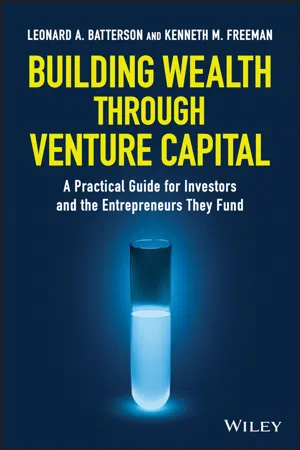
Building Wealth through Venture Capital
A Practical Guide for Investors and the Entrepreneurs They Fund
- English
- ePUB (mobile friendly)
- Available on iOS & Android
Building Wealth through Venture Capital
A Practical Guide for Investors and the Entrepreneurs They Fund
About this book
Venture capital demystified, for both investors and entrepreneurs
Building Wealth Through Venture Capital is a practical how-to guide for both sides of the table—investors and the entrepreneurs they fund. This expert author duo combines renowned venture capital experience along with the perspective of a traditional corporate executive and investor sold on this asset class more recently to flesh out wealth-building opportunities for both investors and entrepreneurs. Very simply, this book will guide investors in learning how to succeed at making money in venture capital investment, and it will help entrepreneurs increase their odds of success at attracting venture capital funds and then employing those funds toward a lucrative conclusion.
The authors explain why venture capital will remain the asset class best-positioned to capitalize on technological innovation in the coming years. They go on to demystify the market for those seeking guidance on reaping its rich returns. Learn what it takes to succeed as an investor or entrepreneur, and gain the wisdom of experience as the authors explain key factors that determine outcomes.
Through a relaxed, down-to-earth narrative, the authors share their own experiences as well as those of their nationally-recognized colleagues. Illustrative anecdotes and personal interviews expand upon important points, and case studies demonstrate the practical effect of critical concepts and actions. World-class professional expertise and personal experience come together to help you:
- Understand the nature of both venture capitalists and successful entrepreneurs
- Develop wealth-building capabilities in investing in or attracting venture capital
- Learn how entrepreneurs and investors can work together toward a lucrative conclusion
- Examine the ways in which recent financial regulatory developments and technological advances already in place are democratizing access to venture capital, enabling unprecedented expansion of venture capital opportunities
As the field expands through these regulatory and technological developments, savvy participants will have unprecedented opportunity to benefit. Building Wealth Through Venture Capital explains what you need to know, and shows you how to navigate this arcane but lucrative asset class.
Frequently asked questions
- Essential is ideal for learners and professionals who enjoy exploring a wide range of subjects. Access the Essential Library with 800,000+ trusted titles and best-sellers across business, personal growth, and the humanities. Includes unlimited reading time and Standard Read Aloud voice.
- Complete: Perfect for advanced learners and researchers needing full, unrestricted access. Unlock 1.4M+ books across hundreds of subjects, including academic and specialized titles. The Complete Plan also includes advanced features like Premium Read Aloud and Research Assistant.
Please note we cannot support devices running on iOS 13 and Android 7 or earlier. Learn more about using the app.
Information
PART I
Understanding the Major Players
CHAPTER 1
The Venture Capitalist: Funder of Dreams
- Ambiguity in that not much can happen before he or she has investor money in hand, and often that money must be secured before he can even tell the investors the deals he has to offer.
- Ambiguity in that he or she must read between the lines, as investment decisions must be made before much of the information one would like is available.
- Ambiguity in that the investments are usually highly illiquid; most must be held for 5–10 years, through good times and bad, before success or failure can be known.
- Ambiguity in that entrepreneurs may love him as their essential source of money and yet hate him because of the controls and limitations he may insist on imposing in exchange for that money.
- Ambiguity in that investors must think enough of him to invest with him, may then grow impatient and displeased, waiting so many years for a return, and then love him dearly for the stellar returns he may ultimately deliver.
CHAPTER 2
The Entrepreneur: His Mind and His “Cultivation”
DNA of the Entrepreneur
Driven by Passion
Motivated by the Opportunity to Make a Positive Difference
Table of contents
- Cover
- Title Page
- Table of Contents
- Preface
- Introduction
- PART I: Understanding the Major Players
- PART II: For the Investor: A Guide to Realizing Big Returns
- PART III: For the Entrepreneur: A Guide to the Money Search and All That Follows
- PART IV: Looking Ahead: What’s to Come
- Acknowledgments
- About the Authors
- Index
- End User License Agreement